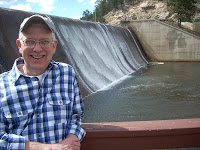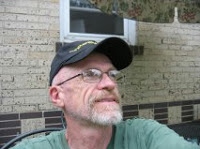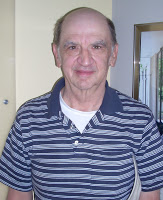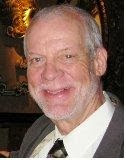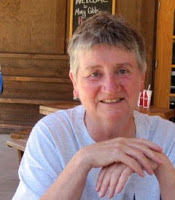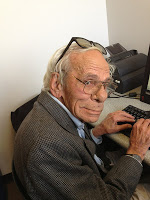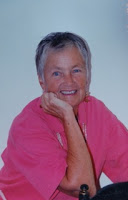My marriage to Myrna Kay Vance Hoyle worked very well for
many years. I am sure Myrna was trying to have the world’s best marriage, to
live the dream of being the princess with her prince charming to fulfill the
purpose of her mother’s rather unrelenting discipline that focused on making
her a housewife so she could rear and educate children and care for her
husband. So Myrna approached her life as a wife with enthusiasm and talent and
a wonderful attitude.
many years. I am sure Myrna was trying to have the world’s best marriage, to
live the dream of being the princess with her prince charming to fulfill the
purpose of her mother’s rather unrelenting discipline that focused on making
her a housewife so she could rear and educate children and care for her
husband. So Myrna approached her life as a wife with enthusiasm and talent and
a wonderful attitude.
I was living into the cultural fantasy of the straight life
even though from an early age I was far from straight. I wanted a family not as
the fulfillment of a dream but as a matter of course. How else could anyone
live? I wanted the pleasures and security of family life and so worked in my
way with good humor, consideration, kindness, and reliability to make it
possible. I liked family life with its endless variety—Myrna’s and my family life
spiced up with children, foster children, unusual friendships, and great
tolerance.
even though from an early age I was far from straight. I wanted a family not as
the fulfillment of a dream but as a matter of course. How else could anyone
live? I wanted the pleasures and security of family life and so worked in my
way with good humor, consideration, kindness, and reliability to make it
possible. I liked family life with its endless variety—Myrna’s and my family life
spiced up with children, foster children, unusual friendships, and great
tolerance.
Myrna was interested in home economy and observed I had
little interest in keeping up with domestic bookkeeping. “Would it help you if
I kept the books?” she asked. “Sure,” I replied. I wasn’t into some stereotype.
Perhaps she was since her mother kept the books for the family farm where she was
reared.
little interest in keeping up with domestic bookkeeping. “Would it help you if
I kept the books?” she asked. “Sure,” I replied. I wasn’t into some stereotype.
Perhaps she was since her mother kept the books for the family farm where she was
reared.
My focus was outside the home although I loved my wife and
our children and the other denizens of our house on Volutsia Street or our
apartment on Las Vegas Boulevard or our rental on Bald Hill Road or the
apartment on Ellis Boulevard or our townhouse on Morris Street or the apartment
at Sixth and Lead or our residence in the basement of her parent’s farm home or
the apartment on Boulder Blvd. I came home every night, twice a month happily
turned over my paycheck, occasionally helped solve domestic conflicts, all this
with joy, calm, commitment, and laughter.
our children and the other denizens of our house on Volutsia Street or our
apartment on Las Vegas Boulevard or our rental on Bald Hill Road or the
apartment on Ellis Boulevard or our townhouse on Morris Street or the apartment
at Sixth and Lead or our residence in the basement of her parent’s farm home or
the apartment on Boulder Blvd. I came home every night, twice a month happily
turned over my paycheck, occasionally helped solve domestic conflicts, all this
with joy, calm, commitment, and laughter.
My wife and I respected and loved each other. Although we
both worked to lessen or avoid conflict, we certainly could talk through, even
argue our different perspectives and come to a mutually agreeable solution.
Neither of us was selfish although I had a much greater capacity for being so
than she. And I had this longtime nurtured gay self that I appreciated and
loved. I didn’t repress my homosexuality but realized that in order to live my life
as a minister in a church I had to sublimate any number of my urges. Still I
found ways to respect this part of myself, and even satisfy some of it without
hurting other people or myself. I was skilled in my duplicity. I was also
always aware that what was gay about me was certainly not hidden. I knew myself
and I knew that others—at least some others—surely perceived this other part of
me.
both worked to lessen or avoid conflict, we certainly could talk through, even
argue our different perspectives and come to a mutually agreeable solution.
Neither of us was selfish although I had a much greater capacity for being so
than she. And I had this longtime nurtured gay self that I appreciated and
loved. I didn’t repress my homosexuality but realized that in order to live my life
as a minister in a church I had to sublimate any number of my urges. Still I
found ways to respect this part of myself, and even satisfy some of it without
hurting other people or myself. I was skilled in my duplicity. I was also
always aware that what was gay about me was certainly not hidden. I knew myself
and I knew that others—at least some others—surely perceived this other part of
me.
Myrna and I had a great marriage, and we reared two most
interesting kids and nurtured many friends and inspired other couples to do
likewise. So why the separation? Why the eventually divorce?
interesting kids and nurtured many friends and inspired other couples to do
likewise. So why the separation? Why the eventually divorce?
When the children left home and Myrna and I were back at the
one-on-one life all the distractions and responsibilities of rearing children
lessened. Oh we still had others living with us from time to time, but I finally
could satisfy other needs, and without the children present, I did so. I did
worse than break one clause in our marriage vows: “and keep yourself only for
her.” I broke that vow with other men whom I liked intensely. Feeling the
emotional change in me, Myrna finally let herself see what she’d long known.
Finally we talked, but rushing the matter we were unable to resolve the problem.
Emotion can cause such failure, but the real failure was the institution of
marriage itself.
one-on-one life all the distractions and responsibilities of rearing children
lessened. Oh we still had others living with us from time to time, but I finally
could satisfy other needs, and without the children present, I did so. I did
worse than break one clause in our marriage vows: “and keep yourself only for
her.” I broke that vow with other men whom I liked intensely. Feeling the
emotional change in me, Myrna finally let herself see what she’d long known.
Finally we talked, but rushing the matter we were unable to resolve the problem.
Emotion can cause such failure, but the real failure was the institution of
marriage itself.
When we divorced some years later, a longtime friend said, “I
wish you wouldn’t. Yours was the only marriage I ever thought was worth all
problems.” I thought about her kind words and finally realized the problem was
that no one had ever developed marriage for bisexual folk. Drat.
wish you wouldn’t. Yours was the only marriage I ever thought was worth all
problems.” I thought about her kind words and finally realized the problem was
that no one had ever developed marriage for bisexual folk. Drat.
Still, Myrna’s and my friendship survived the conflict and
pain, as did our commitment to our children, grandchildren, and many
friendships from our married days. Marriage as a reified institution with a
long history of mythology and law to bolster it eventually didn’t work for us. No
matter how hard we both tried. Still what brought us together in the first
place—friendship and love—continues to flourish between us.
pain, as did our commitment to our children, grandchildren, and many
friendships from our married days. Marriage as a reified institution with a
long history of mythology and law to bolster it eventually didn’t work for us. No
matter how hard we both tried. Still what brought us together in the first
place—friendship and love—continues to flourish between us.
© 8 December,
2014
2014
About the Author
Phillip Hoyle
lives in Denver and spends his time writing, painting, and socializing. In
general he keeps busy with groups of writers and artists. Following thirty-two
years in church work and fifteen in a therapeutic massage practice, he now
focuses on creating beauty. He volunteers at The Center leading the SAGE
program “Telling Your Story.”
lives in Denver and spends his time writing, painting, and socializing. In
general he keeps busy with groups of writers and artists. Following thirty-two
years in church work and fifteen in a therapeutic massage practice, he now
focuses on creating beauty. He volunteers at The Center leading the SAGE
program “Telling Your Story.”
He also blogs at artandmorebyphilhoyle.blogspot.com
